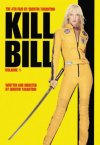BUY THE DVD:
|


|
|
|
SYNOPSIS:
| |
a female assassin attacked on her wedding day by her group leader, bill, wakes up from a coma and seeks revenge.
|
|
|
MOVIE FACT:
| |
warren beatty was originally offered the role of bill.
|
|
|
RATING:
|




four out of four possible stars
|
|
|
|
A literally stunning film from start to finish, one wonders why Miramax boss Harvey Weinstein decided to chop the Kill Bill saga into two different films, since sitting in the theater for three plus hours would not have been at all difficult. Director Quentin Tarantino's original cut of the film was reportedly over three hours long and after a gossip inspiring stand-off, the decision was made to turn the film into a two part release, with the second "volume" scheduled to come to theaters in February of 2004.
After Kill Bill Vol. 1 ends, one is left bereft and lonely, as if the filmmakers have packed up to leave the audience to wonder forever about the final outcome of Black Mamba (Uma Thurman's ass kicking, samurai sword wielding, Japanese speaking expert assassin character) and her human targets. It's clear that the editing of the film was altered to create a sense of completion at the end of Vol. 1, and though this seems to have been accomplished (some loose ends are neatly tied up), the film easily could have stretched on for another hour and not have offended any viewer's backside.
Leaving aside for the moment the expert Kung-Fu sequences, the caustic verbal delivery by talented actors, and the tens of thousands of gallons of blood that must have been used during the production, what really should be addressed first is the rip-roaring soundtrack that thumps hard into the skull of anybody daring to sit too close to the screen (or the speakers, as it were). It is easily evident in all of Tarantino's films that music is one of the foremost and noticeable elements in his movies. Though music can be used to the detriment of a film's emotional output (far too often an orchestral score "tells" the audience what to feel), Tarantino seems adept at making the music work for the characters instead of against them.
One of the most interesting aspects of the editing of the film is the clear evidence of Tarantino's great love of Asian film. Though he seems to be a particular fan of martial arts films, there is a particular characteristic of Asian film that is present in Kill Bill. It is the usual technique for American filmmakers to fill every aspect of their films with music, dialogue, or sound effects, but Asian filmmakers have long understood the value of silence and Tarantino takes this idea and employs it to the hilt.
Especially near the end of the film, when Uma Thurman and Lucy Lui (playing Tokyo crime boss, "O-Ren Ishi") partake in a ferocious duel in a snow-covered garden (whose physical look seems directly lifted from Ang Lee's Crouching Tiger Hidden Dragon). Thurman and Lui spend long seconds staring at one another, preparing their defenses, and waving their swords in the air. Surprisingly, though the effect is usually comical, the use of the "long silent stare" doesn't decrease the emotional effectiveness of the story or the believability of the characters.
While one has to suspend quite a load of disbelief during just about every scene in the film, every member of the cast makes his or her character an entertaining one. And that is perhaps the most important aspect of Tarantino's film. Kill Bill is more than just an entertaining "chop-socky" film. It doesn't just pay homage to that genre. With Tarantino's very unique slant on filmmaking, Kill Bill is very evidently a Tarantino film, but it's a different beast than his prior movies.
Though the caliber of the performances and the enthusiastic soundtrack are hallmarks of his films, Bill is a step in the forward direction for the filmmaker. With this film, he can rest easy in the knowledge that he won't be pegged as the maker of one specific type of film. There are similarities in all his films (violence being the strongest), but it's hardly an easy task to pigeonhole the director into a certain genre. Though if he continues to cut such a unique swath through the feature film world, he might be worthy of a genre all his own in the coming decades.
It's tempting to say, "Tarantino does it again," but having never missed the mark in any of his feature films thus far, his rate of success seems super-human at this point. Whatever one's opinion about the intense violence, frequently ridiculous stunts, or the way his characters never seem to have any problems thinking up witty things to say, Tarantino makes us believe in his characters and their story. Kill Bill's only flaw is the fact that half of it has yet to unspool and that audiences will have to toil around for months waiting for their next Tarantino fix.
Review by Kelsey Wyatt.
| |
|